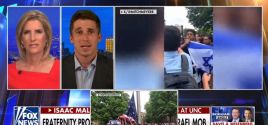Another Urban Legend? The Middle Ages Were the "Dark Ages"By David J. TherouxThe Beacon Apr. 13, 2015 |
Popular 
"We Were There First and Foremost for Our Country of Israel," UNC Frat Bro Tells Fox News

Video Shows Israeli Soldiers 'Using Palestinian as a Human Shield'

BlackRock CEO: 'Xenophobic' Countries With Shrinking Populations May Be The 'Big Winners' in AI-Driven Future

Report: Daily Wire Got Secret Gag Order Against Candace Owens 'While Publicly Negotiating a Debate'

House Passes 'Antisemitism Awareness Act' to Silence Criticism of Israel as Hate Speech
 As the culture wars intensify in America, let’s consider some of the roots of these contentious conflicts. With the “Age of Enlightenment” of the 17th and 18th centuries, a “modern” narrative was invented to explain the history of the West, the wider world, and humankind’s place in the universe. This narrative claimed that liberty, democracy, republicanism and religious tolerance could only be achieved through an “Enlightenment project” of secularism taking control of both the public square and the commanding heights of society and that the abandonment of metaphysics and religious tradition were essential for human progress. Proponents of this narrative then included Denis Diderot, Voltaire, Jean-Jacques Rousseau, Edward Gibbon, and David Hume, and in the 19th century such writers as John Draper and Andrew Dickson White. With some exceptions, this worldview came to dominate western elite and popular thinking. However many historians have since increasingly challenged this narrative as fundamentally fallacious. Such historians as J.G.A. Pocock, Dale Van Kley, Derek Beales, and Jonathan Israel have discarded the claim of an exclusively secular “Enlightenment” and shown that there have been multiple and far more causal Enlightenments, based in various Catholic, Protestant and Jewish traditions. In addition and since the 1970s, historians of science Ronald L. Numbers, David V. Lindberg, and James R. Moore have refuted the erroneous and indeed propagandistic, secular claims of Draper and White that Christianity and science are adversarial. Indeed, it has been these religious traditions that were primarily responsible for the revolutionary economic, legal, technological, and cultural changes that have uplifted the West, and that such changes began well before the 17th century. Sociologist Rodney Stark has shown that it was the Judeo-Christian tradition that produced all aspects of progress in the West, including the ideas of objective morality and truth, free-market capitalism, reason and science, natural law, individual liberty and the abolition of slavery and infanticide, civic virtue, and the rule of law. (Among his many notable books are The Victory of Reason, The Triumph of Christianity, How the West Won, and For the Glory of God.) In “The Secular Theocracy,” I have also discussed the “Enlightenment project”‘s hypocritical and intolerant crusade that “exalts a sovereign and powerful state that pervades all of life and compels obedience not just to its mandates but to the secular nationalism of the Zeitgeist itself, for which the populace is forced to conform to and fund.” Stark and others have further shown that the “secular Enlightenment” narrative rests upon numerous historical falsehoods that today are still taken for granted and commonly taught in schools. The following video discusses one such fallacy—why the Middle Ages were not the “Dark Ages,” including the “urban legend” that people then believed in a Flat Earth: |



